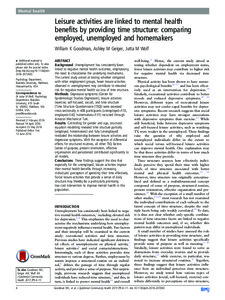Leisure activities are linked to mental health benefits by providing time structure: comparing employed, unemployed and homemakers

Goodman, William ; Geiger, Ashley ; Wolf, Jutta
Journal of Epidemiology and Community Health
2017
71
1
4-11
depression ; leisure ; mental health ; time management ; unemployed
Psychosocial risks
http://dx.doi.org/10.1136/jech-2016-207260
English
Bibliogr.
"Background Unemployment has consistently been linked to negative mental health outcomes, emphasising the need to characterise the underlying mechanisms. The current study aimed at testing whether compared with other employment groups, fewer leisure activities observed in unemployment may contribute to elevated risk for negative mental health via loss of time structure.Methods Depressive symptoms (Center for Epidemiologic Studies Depression), leisure activities (exercise, self-focused, social), and time structure (Time Structure Questionnaire (TSQ)) were assessed cross-sectionally in 406 participants (unemployed=155, employed=140, homemakers=111) recruited through Amazon Mechanical Turk.Results Controlling for gender and age, structural equation modelling revealed time structure partially (employed, homemakers) and fully (unemployed) mediated the relationship between leisure activities and depressive symptoms. With the exception of differential effects for structured routines, all other TSQ factors (sense of purpose, present orientation, effective organisation and persistence) contributed significantly to all models.Conclusions These findings support the idea that especially for the unemployed, leisure activities impose their mental health benefits through increasing individuals' perception of spending their time effectively. Social leisure activities that provide a sense of daily structure may thereby be a particularly promising low-cost intervention to improve mental health in this population."
Digital
The ETUI is co-funded by the European Union. Views and opinions expressed are however those of the author(s) only and do not necessarily reflect those of the European Union or the ETUI.